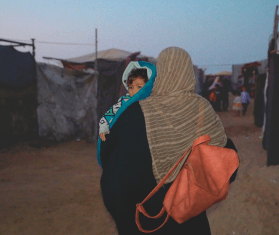In recent weeks, attacks by non-state armed groups in Mozambique’s northern Cabo Delgado province have driven more than 30,000 people from their homes—marking the largest movement of displaced people so far this year. This region is one of Mozambique’s most volatile as it has been the scene of intense conflict that has displaced more than 800,000 people since October 2017.
Many of those who’ve been forced to flee since the violence began are in need of humanitarian assistance, including health care, water and sanitation, and food. While Doctors Without Borders/Médecins Sans Frontières (MSF) remains committed to providing medical and humanitarian aid, it’s critical that other organizations and actors step up to help close the gaps.
Violence fuels mass displacement
Over the past year, Mozambican armed forces and regional allies have increased their presence in a number of regions, shifting the hotspots of violence. For example, throughout June, fear of violence followed by confirmed attacks have triggered panic and mass movements of people from areas near the provincial capital of Pemba that were previously considered relatively safe and stable, such as Ancuabe and Chiure districts.
The situation in Cabo Delgado remains very fluid. Many people have been forced to flee their homes multiple times as government forces clash with non-state armed groups, often abandoning their possessions and uprooting their lives.
MSF teams have been distributing relief items in various locations where people are sheltering following recent attacks, such as Ntele—in Montepuez district—where more than 1,000 families arrived in late June. Most arrived with few or no possessions and in great psychological distress. So far, MSF teams have distributed more than 700 kits containing essential items like tents, jerrycans for water, cooking pots, and mosquito nets. MSF teams continue to provide medical assistance in areas with established MSF projects such as Macomia, Mueda, and Palma.

Humanitarian needs are enormous
Some areas in Cabo Delgado province already hosted large numbers of displaced people and are now having to adapt to a fresh influx of arrivals. In most places, the humanitarian aid available is massively insufficient compared to people’s needs, including those for health care, water and sanitation, and food. In some of the harder-to-reach areas—particularly in northern and central parts of the province—assistance is very limited.
MSF teams are working in districts where people have had their lives overturned by fear of attacks, counterattacks, and unpredictable eruptions of violence. In some cases, MSF is the only international humanitarian organization working there on a permanent basis despite the clear need for much more aid.
Many people avoid the towns at night because they feel they will be safer out in the fields and the bush. But here they face other dangers, such as malaria. In Macomia, for example, four out of every ten adults who came to MSF clinics in May—and eight out of every ten children—tested positive for this deadly disease.
Across the province, specialist care for chronic medical conditions, such as HIV, is often unavailable despite the prevalence of such diseases in the area. In Mueda, a hill town in the north of Cabo Delgado province—where MSF teams work in the local hospital and run mobile clinics—the conditions of many patients have declined after their HIV treatment was interrupted.

Conflict takes a toll on people’s mental health
The crisis in Cabo Delgado is far from over. With the violence continuing unabated, hundreds of thousands of people are suffering from the effects—both physically and mentally—of fear, violence, and displacement. Almost everyone in the region has experienced trauma of some kind during this conflict as a result of witnessing or experiencing violence or losing their loved ones or their homes.
As long as MSF can ensure that its teams are safe, it will continue to strive to reach the most vulnerable people in Cabo Delgado province. With such huge humanitarian needs, it is critical that people can access assistance.




